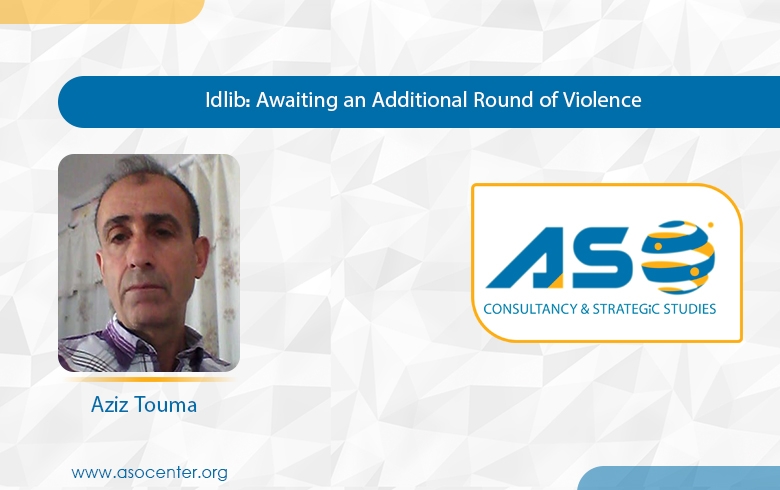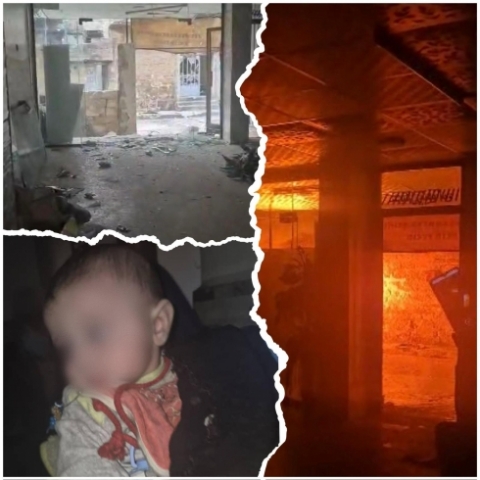

Idlib: Awaiting an Additional Round of Violence
2020-04-06
Writer: Aziz Touma
The Turkish President, on his way to Moscow recently, has carried to his Russian counterpart more pending files between the two parties, especially the file related to Idlib, where his forces were subjected to a setback that managed killing tens of his soldiers by strikes from the missiles of the Syrian forces in Jabal Al-Zawiya in the south, in February 2020 under the undisclosed cover of its Russian ally. This was an explicit message to the President Recep Tayyip Erdogan, a message that included the urge to moderate his demands, and to amend the nature of the understandings of the Sochi and Astana agreements. As well as, to accept the facts of the new reality, after the painful blow that caused an imbalance in the previously volatile relationship, as the new facts have imposed a new reality. The two parties, after six-hour talks and after a great deal of efforts, reached supplements to previous understandings, such as reducing the escalation on the lines of contact in Idlib and establishing a safe passage with the depth of six kilometers on both sides of the Aleppo-Lattakia road. Not to mention, conducting joint Turkish-Russian patrols, however, this will be compensated. As in order for Putin to maintain the bilateral relationship with his counterpart in various files, mainly the economic one, his counterpart had to save face. As a result, he legalized the military Turkish presence in the areas of “The Shield of Euphrates,” “The Olive Branch” and “Spring of Peace” in exchange for the legitimacy of the presence of the Syrian forces in the recently bitten off areas with an evident Russian air cover. However, what is remarkable is that there are also obscure matters, especially regarding the lack of any details concerning the planned implementation and the subsequent initiation in the military talks about how to develop the safe passage. As well as, the complex file that haunts the Turkish party, which is the north east file of the Euphrates controlled by the SDF which has independent autonomous administration. In this particular file, there may be an implicit green light from the Russian leadership, for the retaliatory attacks of Turkey against the cities dominated by the SDF, such as Kobani or Manbij, in exchange for the retreat of the forces of the opposition control of the subordinate territories, in addition to the commitment of Turkey to self-restraint to record levels. This explains perhaps the calm before the storm among the official Turkish government, as well as among the pro-Islamist opposition. Mostly since Russia had asked the SDF in 2019, that in case it did not integrate with the Syrian army, and continued to support the American presence, it would not hesitate to push Turkey to proceed its attacks.
Erdogan is fully aware that there is no place for deception in Moscow with the Russian ally, Vladimir Putin, who is still weaving his firm attitudes on the measurement of the Soviet era. As he is closely proficient in the political game and does not back down from the pre-set plan, even if this leads to sacrifice of common political and economic interests. As For when he wanted to hold this round of negotiations, he "intentionally" wanted it to take place in Moscow and not in Ankara; in a hall where the statue of Catherine II or the Cesarean "Great Catherine,” was set at the forefront, as she was known for her cunning that stood long in the face of the Ottoman Empire spread and fought in wars against them in 1768, and managed recovering the Crimea from them in 1771. The statue was standing tall behind the Turkish delegation and before the eyes of the “Sultan: Erdogan.” The “Caesar: Putin” was supposed to come to Istanbul to hold a quadripartite summit with both French President Macron and German Chancellor Merkel, however this did not happen, as bringing the delegation to the Russian capital was a demonstration of the Turkish leaders weakness, their being drawn to the trap, humiliation, and willingness to make painful compromises.
The other message that he addressed to the summit included the sending of two Russian frigates, the frigate “Makarov” and the frigate “Grigorovich,” across the Bosphorus to the Syrian coast, as they had played a major role in the past in severe strikes to the Ottoman Navy between 1877 and 1878. In addition to ships carrying hundreds of soldiers, weapons and equipment with the aim of reinforcing their presence in the Mediterranean to anticipate any confrontation with the Turkish party.
On the other hand, the Erdogan government has repeatedly announced its intention to start a broad-based military operation, side by side with its loyal armed radical organizations at the end of February, unless the Syrian forces withdraw beyond the lines of the Sochi Agreement, right after the killing of its soldiers. However, this did not happen, firstly due to the full awareness of Erdogan of Putin’s mentality that descends from the Soviet one, as well as the Russian determination and the degree of its earnestness in proceeding with its project until the end. Secondly, he also realizes the fragility of European support, which did not express its preparedness to be involved in an unaccounted adventure confronting the Russian army for “the sake of the Sultan.”
Despite their coalition in the NATO, and especially since the European Union was “weary” of the evasions of the autocratic Ottoman sultan, his fluctuating attitudes and the constant “extortion,” in particular regarding the immigration file, that is when Erdogan promoted hundreds of thousands of refugees of his land, mostly of Asian origin and mainly from Afghanistan, to the borders of the European Union, thereafter obtaining massive funds reaching 6 billion Euros in exchange for carrying the burden of migrants, as he aimed at punishing the Union for its non-supportive attitudes.
After all that has happened, it seems that Turkey is fully convinced that the cease-fire in Idlib will not last for long and that the repatriation of violence again is a matter of time, due to a sharp contradiction between the agendas of the conflicting parties. Perhaps the coming days or months will be loaded with conflicts and disputes, while the corona-virus strikes most of the world and claims lives of people on a daily basis, indifferent of the existing borders between the countries. If the developed countries that have very sophisticated medical means are relatively incapable of limiting the spread of this epidemic, what are the abilities of the underdeveloped countries, which are afflicted by boundless conflicts and "existential" wars? and do not have any technical capabilities at the visible level to confront this deadly disease.
In conclusion, in the light of the acknowledgement of the “other” culture absence, everything becomes permissible and possible, even killing, burning and slaughtering. If everything that is taking place is part of this culture, then the engine of rejection will be delirious hatreds that are hostile to the values of a free and dignified life. How can this very grave predicament be resolved? How can we reconcile the “I” with the “other?” History must be inclined here, because every consciousness outside the history and living on the rhythm of the past that restrains every change and the right of difference, a rhythm of which the world has historically crossed, means falling into the trap of stagnation and oppression.
Therefore, the settlement, above all, is a matter of consciousness; an issue of the transition from myth to reason. As it is not possible to combine them, because it is related to two types of perceptions, and two types of presence in this world. It is the mind that created modernity, in which Kant is credited for as he laid the principles of human rights and the harmonious modern society that does not need generals and elder statesman, when it falls into conflict with the worn out left and religious ideologies and surpass them. Consequently, in order to overcome these existing conflicts, modernity must exist in the experience of the livelihood, otherwise we will witness more violence and tension.



